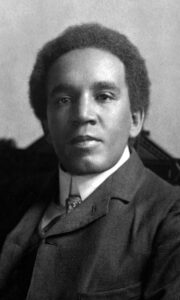Samuel Coleridge-Taylor
Samuel Coleridge-Taylor was born in 1875 in London, England to Alice Hare Martin (1856–1953), an English woman, and Dr. Daniel Peter Hughes Taylor, a Krio from Sierra Leone who had studied medicine in the capital. He became a prominent administrator in West Africa. The couple never married.
Alice Martin named her son Samuel Coleridge Taylor after the poet Samuel Taylor Coleridge. They lived with her father Benjamin Holmans and his family after she had her son. Her father was a skilled farrier and was married to a woman other than her mother; they had four daughters and at least one son. Alice and her father called her son Coleridge. The family lived in Croydon, Surrey. In 1887 Alice Martin married George Evans, a railway worker.
Taylor was brought up in Croydon. There were numerous musicians on his mother’s side and her father played the violin. He started teaching it to Coleridge when he was young. His ability was obvious when young, and his grandfather paid for the boy to have violin lessons. The extended family arranged for Taylor to study at the Royal College of Music, beginning at the age of 15. He changed from violin to composition, working under professor Charles Villiers Stanford. After completing his degree, Taylor became a professional musician, soon being appointed a professor at the Crystal Palace School of Music; and conducting the orchestra at the Croydon Conservatoire.
The young man later used the name “Samuel Coleridge-Taylor”, with a hyphen, said to be following a printer’s typographical error. In 1894, his father Dr. Daniel Taylor was appointed coroner for the British Empire in the Province of Senegambia.
In 1899 Coleridge-Taylor married Jessie Walmisley, whom he had met as a fellow student at the Royal College of Music. Six years older than him, Jessie had left the college in 1893. The couple had a son, named Hiawatha (1900–1980) after a Native American immortalized in poetry, and a daughter Gwendolyn Avril (1903–1998). Both had careers in music: Hiawatha adapted his father’s works. Gwendolyn started composing music early in life, and became a conductor-composer in her own right; she used the professional name of Avril Coleridge-Taylor.
By 1896, Coleridge-Taylor was already earning a reputation as a composer. He was later helped by Edward Elgar, who recommended him to the Three Choirs Festival. His “Ballade in A minor” was premiered there. His early work was also guided by the influential music editor and critic August Jaeger of music publisher Novello; he told Elgar that Taylor was “a genius”.
On the strength of Hiawatha’s Wedding Feast, which was conducted by Professor Charles Villiers Stanford at its 1898 premiere and proved to be highly popular, Coleridge-Taylor made three tours of the United States. In the United States, he became increasingly interested in his paternal racial heritage. Coleridge-Taylor participated as the youngest delegate at the 1900 First Pan-African Conference held in London, and met leading Americans through this connection, including poet Paul Laurence Dunbar and scholar and activist W.E.B. Du Bois.
In 1904, on his first tour to the United States, Coleridge-Taylor was received by President Theodore Roosevelt at the White House. Coleridge-Taylor sought to draw from traditional African music and integrate it into the classical tradition, which he considered Johannes Brahms to have done with Hungarian music and Antonín Dvořák with Bohemian music. Having met the African-American poet Paul Laurence Dunbar in London, Taylor set some of his poems to music. A joint recital between Taylor and Dunbar was arranged in London, under the patronage of US Ambassador John Milton Hay. It was organized by Henry Francis Downing, an African-American playwright and London resident.
Composers were not handsomely paid for their music, and they often sold the rights to works outright in order to make immediate income. This caused them to lose the royalties earned by the publishers who had invested in the music distribution through publication. The popular Hiawatha’s Wedding Feast sold hundreds of thousands of copies, but Coleridge-Taylor had sold the music outright for the sum of 15 guineas, so did not benefit directly. He learned to retain his rights and earned royalties for other compositions after achieving wide renown but always struggled financially.
Coleridge-Taylor was 37 when he died of pneumonia on September 1, 1912. His death is often attributed to the stress of his financial situation. He was survived by his wife Jessie (1869–1962), their daughter Avril and son Hiawatha.
https://en.wikipedia.org/wiki/Samuel_Coleridge-Taylor

